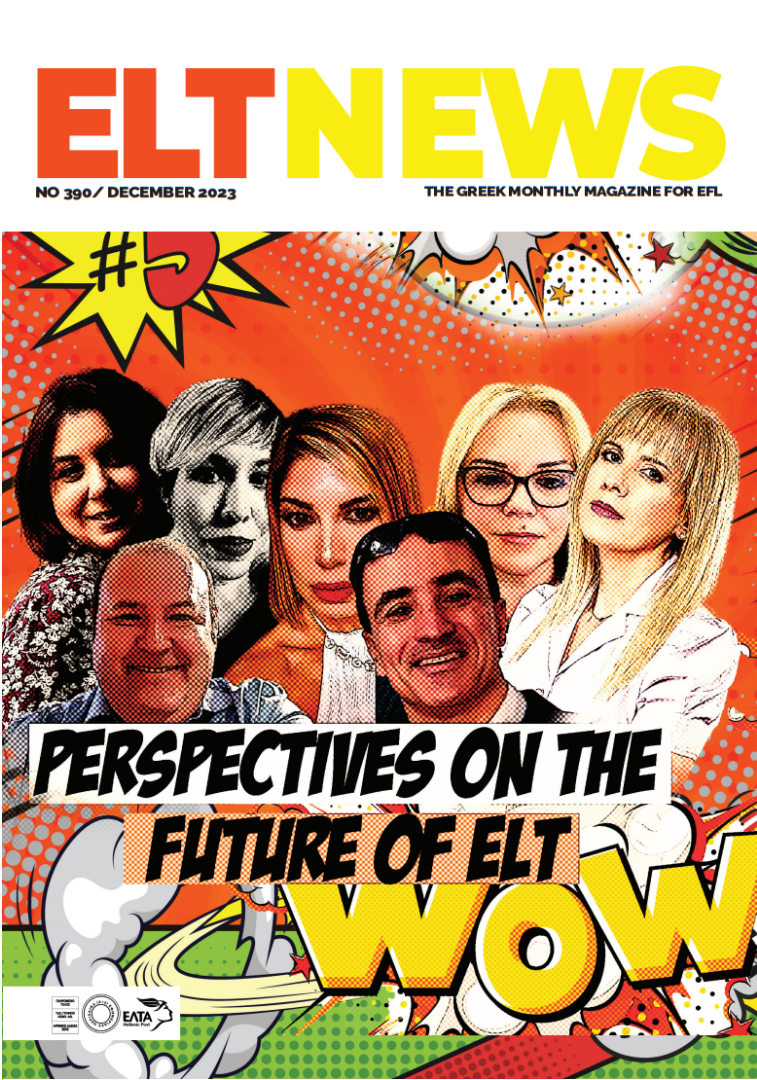ELT is changing
Major changes are happening in ELT triggering new educational models and transformations. New teaching programmes, and new approaches and techniques are being developed creating opportunities and challenges for our sector.
Technology Integration
Online Learning: The integration of technology and the rise of online platforms are transforming traditional teaching methods. This includes the use of virtual classrooms, interactive multimedia resources, and educational apps to enhance language learning.
Text by: Anastasia Spyropoulou
Global Collaboration
Cross-cultural Collaboration: English is increasingly seen as a global language, and educators are focusing on connecting students across borders for collaborative projects, language exchange, and cultural understanding.
Task-Based Learning
Real-life Applications: A shift towards task-based language teaching, where language learning is integrated into real-life tasks and activities, promoting practical language use.
Focus on Communication Skills
Speaking and Listening: A growing emphasis on developing students’ speaking and listening skills alongside traditional reading and writing skills, reflecting the need for effective communication in real-world situations.
Inclusive Practices
Diversity and Inclusion: The importance of creating inclusive environments that address the diverse needs of learners, including those with different cultural backgrounds, learning abilities, and language proficiency levels.
Professional Development
Continuous Learning: Recognition of the importance of ongoing professional development for teachers to keep pace with the evolving field and to effectively integrate new methodologies and technologies into their teaching practices.
Task Automation
Language Learning Apps: The rise of language learning applications and AI-driven platforms that offer personalized feedback and assistance, allowing learners to practice and improve their language skills independently.
Global Certification Standards
Common European Framework of Reference (CEFR): Increasing adoption of global standards like CEFR to measure language proficiency consistently across different regions and institutions.
Environmental Awareness
Sustainability and Green Practices: A growing awareness of the environmental impact of education, leading to efforts to make ELT materials and practices more sustainable.
Educational institutions and teachers often adapt to these changes to provide more effective and relevant language education.
So, in this issue we host the views of some of this year’s most influential teacher trainers, and practicing teachers whose innovative and creative ideas have an impact on the ELT scene in our country.
We invited the 2021 and 2022 influencers to talk about the evolving landscape of ELT and share their valuable insights and perspectives on the future of ELT.
How is ELT poised to evolve over the next five years? The field has already witnessed significant changes driven by technology, cultural and pedagogic shifts, and global events.
The invitation was extended to: Maria Araxi-Sachpazian, George Kokolas, Nick Michelioudakis, Katherine Reilly, Evangelia Vassilakou, Maria Davou, Despina Mallidou, Mike Kenteris, Elizabeth Veliou, Natassa Manitsa and Dimitris Primalis.
Not all of them met the deadline; however, the majority managed to contribute and share their insights regarding the following aspects:
- Technological Advancements: How do you envision technology continuing to shape ELT? What role will AI, augmented reality, and virtual classrooms play in language education?
- Cultural Sensitivity and Inclusivity: In an increasingly diverse world, how can ELT adapt to promote cultural sensitivity and inclusivity in language learning?
- Pedagogical Shifts: What innovative teaching methods and approaches do you foresee gaining prominence in the near future? How can they address the ever-evolving needs of language learners?
- Professional Development: As the teaching profession evolves, how can ELT experts and organizations support the ongoing professional development and well-being of educators?
- Global Events and Education: In light of recent global events, how can ELT adapt to address new challenges and opportunities in education, such as remote learning and global interconnectivity?
Enjoy reading!
What are we planning for 2024?
On 23-25 February we are holding the 1st Directors’ Symposium at the Anemolia Domotel Hotel in Arahova – a unique networking experience featuring a panel discussion, a plenary session as well as business meetings with publishers, exams institutions and educational services providers.
The Foreign Languages Forum travels to Crete on March 10, to Larissa on March 31, to Patra on April 21, and Xanthi on April 28.
The events feature panel discussions, plenary sessions, workshops, professional presentations as well as a Book and Resource Exhibition with the most recent production in printed and digital material on display.
More information to follow, so stay tuned!
I take this opportunity to wish you all a relaxing Christmas and a peaceful New Year!
